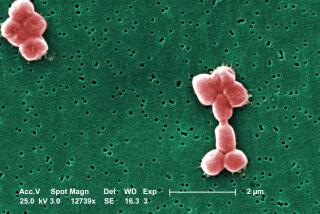Humans Losing Chemical Battle Against Bugs
- Share via
CHICAGO — Humans are losing the battle against insects by using more pesticides than common sense, creating armies of invincible “monster bugs” that no product on the market can stop, experts warned.
Insect resistance, growing with each new chemical challenge, threatens global agriculture and international health and costs about $2 billion annually, said Brian Croft, a professor of entomology at Oregon State University.
“We have definitely created a big problem for ourselves,” he said.
Robert Metcalf, professor of biology and entomology at the University of Illinois in Champaign-Urbana, said: “The short-sighted and irresponsible use of pesticides . . . is producing strains of monster bugs. There are now about 30 species that nothing can kill.”
The insect experts gathered recently at the American Assn. for the Advancement of Science annual meeting at a symposium intended to bring the pesticide problem to the attention of Congress and other governmental agencies.
The scientists suggest that the prevailing insect control effort, which typically involves developing a new pesticide and then saturating the intended victim, results only in making an insect immune to that pesticide.
Three of the more significant cases:
- Malaria had been nearly eliminated from many parts of the world until the World Health Organization decided to eradicate it, Metcalf said. The WHO spent 21 years and almost $2 billion before giving up in 1976; all it had to show for its effort was a race of malaria-carrying mosquitoes virtually immune to all applicable insecticides.
- Cotton bollworms “weren’t a big problem” until farmers decided to spray them. “Most of them were fairly well regulated by their natural predators and when we started throwing pesticides all over the place, we killed our friends,” Metcalf said.
- Since 1950, the destructive Colorado potato beetle has been treated with 15 different insecticides and now enjoys a sort of blanket immunity.
Metcalf and Croft contend that these cases need not have happened and that prudent “integrated pest management” may prevent future such occurrences.
“The main thing is you don’t want to give an insect too many looks at the same pesticide,” Croft said. “What we’re suggesting is that you mix up your bag of tricks.”
Metcalf also suggested reintroducing natural predators into the insect environment, which will adapt along with the bug better than any pesticide.
More to Read
Sign up for Essential California
The most important California stories and recommendations in your inbox every morning.
You may occasionally receive promotional content from the Los Angeles Times.












